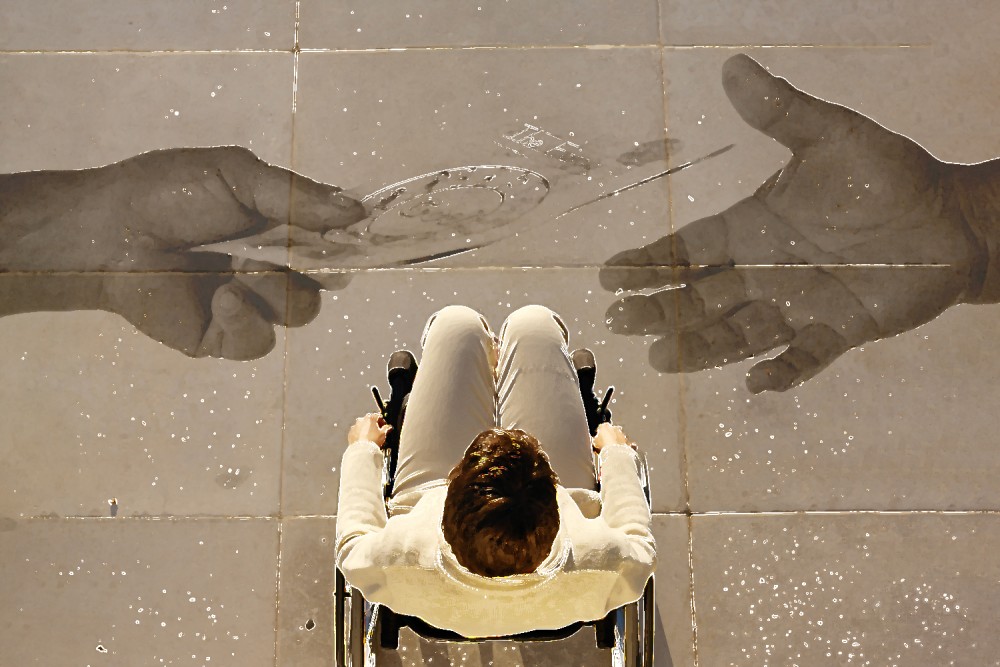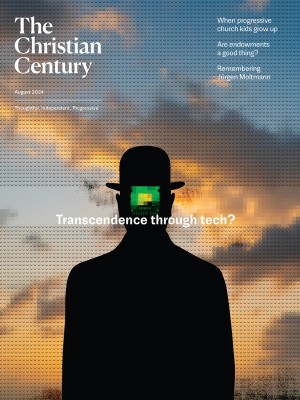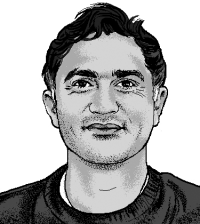Present together
When I was a chaplain intern working with people with disabilities, there was one man I visited every Sunday right after worship.

Century illustration (Source images: George Doyle / Stockbyte / Getty and Erika Giraud on Unsplash)
During seminary, for my field education requirement I worked for a year in the chaplain’s office at a state-run residential facility for people with profound intellectual and developmental disabilities. Clusters of apartment buildings and cottages throughout the 240-acre campus provided housing and care for 500 people, many of whom had lived there for decades due to their health-care needs and our society’s general lack of proper infrastructure to support their lives elsewhere. My work as a chaplain intern was to help organize and lead the Christian worship service on Sundays and to visit regular worship participants who were absent that week due to medical issues. The chaplains would give me a list of the people who had indicated that they’d appreciate a visit during the week since they couldn’t make it to chapel.
There was one person, however, I was sent to visit immediately after worship every Sunday. He had spent most of his adult life at the facility and for all of those decades, as long as he was healthy enough, he made sure he was at the chapel for each and every service or event. For Sunday worship, he regularly served as a greeter. Staff would position his wheelchair at the entrance, where he’d welcome people to church. He was entrusted with making sure each congregant received a worship bulletin, which were stacked on a tray attached to his wheelchair.
Read our latest issue or browse back issues.
These bulletins communicated more than instructions about the order of worship. They were cherished items, endowed with spiritual meaning. Congregants made sure to take them home. When I’d wander residence halls, stopping for conversations with parishioners, I’d see them on coffee tables and nightstands. Staff assistants told me that people would show family members and friends the bulletins when they’d come to campus for visits. To have guests flip through a bulletin was part of sharing about their experience of worship—as if the pages had been imbued with the joy of fellowship, saturated with memories of God’s people, hallowed through sacred use.
By the time I arrived for my year as an intern, the chapel’s faithful and beloved greeter had been recently admitted to the long-term care unit in the infirmary. The frailty of his condition now prevented him from joining his community for worship. But his church didn’t forget him. With a worship bulletin in my hand, I was sent to his hospital room. I’d sit in a chair beside his bed and talk him through the service, with the bulletin as my guide, recounting who did which parts—the prayers, the scripture readers, the preacher for that week. I’d read to him the Bible passages and summarize a few main points from the sermon.
Once, during that first month of visits, as I was straining to understand his words, a medical worker noticed my limitations and interpreted for me. “He’s asking if you could sing the hymn for him, the one y’all sang at church,” she said. “Go on now,” she prodded, “that sure would be a blessing!” I tried to explain my lack of musical capacities, my awful singing voice, but they wouldn’t let me off the hook. So I cleared my throat and gave them my best—for half a verse, embarrassing myself, but they seemed to appreciate the effort (although neither of them protested too much when I stopped). “Well, well, well,” the staff person broke the silence.
“Not quite a blessing?” I said, shrugging my shoulders and shaking my head.
“You are certainly a blessing, even if we don’t ask for an encore,” she said, winking. “Next time bring the choir.” We all laughed.
During my visits with him, the chapel’s beloved greeter, I relied on others to help me understand his words. I struggled to grasp what he’d say to me because of the cerebral palsy that affected his speech. Caregivers, on the other hand, who had known him for years, could communicate with him without much difficulty. The problem was mine, my lack of familiarity with his way of speaking, his linguistic style, his mannerisms. I spent that year trying to learn. I’d sit and listen and watch—attending to his bodily language, his movements and sounds, his words that didn’t sound like words to me, according to the limits of my lexicon. But he was patient with me and always welcoming.
Soon, after a month of my visits, after I’d recount the worship service, play by play, with the bulletin in front of him on the tray across his bed—as I would prepare to leave, I’d see him strain his muscles to urge his arm toward me. From my chair, I’d reach over to hold his hand. And I’d wait with him, without much of anything more to say, as our spirits soaked up what the moment offered. A presence.
The late Benedictine monk Sebastian Moore has a line about such moments in his book God Is a New Language. We must look forward, he says, “to the point when the whole mystery of God will be known in the clasp of your brother’s hand.”
The greeter from the chapel impressed upon me a truth about pastoral ministry—or, perhaps, he just reminded me about the basics of our Christian life: that we attend to each other as if we are attending to God. To wait with another person is to await the presence of the Holy Spirit. To behold a human being is to open ourselves to divine mysteries, the Christ who shares in our flesh.







